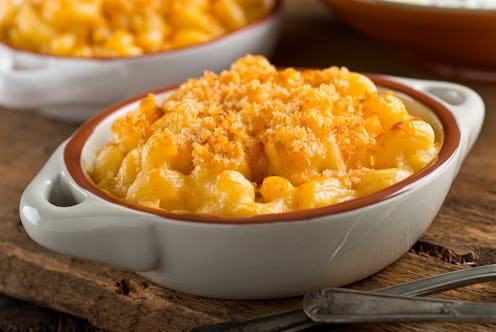I won’t lie: To me, mac and cheese is a perfect food. It’s not because it’s nutritionally complete or anything like that, though; it’s just… always good. There is never a time I am not in the mood for mac and cheese. And if you’re with me, it turns out there’s a scientific reason why we love mac and cheese so much: According to a new study published in the journal Cell Metabolism, foods that are both high in fats and high in carbohydrates fire us up like nothing else. I mean that literally, by the way — the study found that these kinds of foods make the reward centers of our brain light up like a carnival. And what is mac and cheese? A glorious combination of carbs and fats, of course. It all makes sense now!
For the study, which you can read in its entirely online, the researchers started by assembling a collection of pictures of snacks, each of which fell into one of three categories: Fat, carbohydrate, or fat plus carbohydrate. The participants started by rating all of these snacks for “liking, familiarity, estimated energy density, and total calories”; then, on a different day, they fasted for a period and, upon arrival at the lab, were fed a breakfast of orange juice, cheddar cheese, whole-wheat toast, white toast, strawberry jam, and butter (which, honestly, sounds like my ideal breakfast. I would be perfectly happy if I could eat nothing but cheese, fruit, and really good bread for the rest of my life). Three hours after they ate, they were given an exercise to complete: They were told they had five euros to spend and told they could bid anywhere from zero to all five to bid against a computer to buy the snacks they had previously rated. While they underwent this exercise, they were hooked up to an fMRI scanner, which showed the researchers what was going on in their brains as they bid on the items.
The results were twofold, expressing themselves in both the participants’ bidding behavior and in their brain activity: First, they were willing to pay more for the snacks that had both fats and carbs in them than they were for snacks that were primarily carbs or primarily fats; and second, the reward centers of the brain fired up a lot more for snacks in the fats plus carbs category than they did for a variety of other snacks, including the participants’ favorite foods and ones with a larger portion size. These results suggest that foods that are high in both fats and carbs are more rewarding to us than most other options.
According to senior author Dana Small, a professor of psychiatry at Yale University, the thing that makes the study’s findings so fascinating is the fact that foods that are high in both fats and carbohydrates don’t generally exist in nature — except for one very notable source of early nutrition: Breast milk. Breast milk contains both fats and carbs in abundance — so it makes a certain amount of sense that we might be drawn to manufactured or devised foods that are high in both fats and carbs as we get older: They’re not dissimilar from the thing that kept us alive as babies.
Popular Science gets the credit for making the mac and cheese connection — and they’re spot-on with it: Cheese is generally low in carbohydrates, but it’s typically high in fat (which doesn’t mean it’s bad! We need fats to survive; what’s more, a recent study found that regularly eating full-fat cheese can help boost our levels of HDL cholesterol, AKA the good kind of cholesterol); meanwhile, pasta is a complex carbohydrate, but doesn’t have much in the way of fat. Mac and cheese, though? It combines the two in such a way that it gives us a hearty does of both fat and carbs, and, well… it just lines up perfectly with the results of the study, doesn’t it?
However, mac and cheese is far from the only food that might apply here. Pizza also combines complex carbs with fat from cheese, of course; French fries do, as well; ice cream is a simple carb, but also has fats; chocolate is on the list; so is — of course — avocado toast; bagels and cream cheese? Yep; and so on and so forth. All of these foods hit those same reward buttons in our brains. It’s almost as if we’re hardwired to like them — although, as PopSci points out, the likely reality is that we evolved to prefer them over time, with the whole thing kicking up into high gear when processed foods hit the scene.
Get you a partner who will make you mac and cheese pizza as a sign of affection.
Anyway, regardless as to how we got here, the fact remains that here is where we are. Still searching for your platonic ideal mac and cheese? These recipes might help; you also might try a hack or two to mix things up. Because mac and cheese certainly isn’t going anywhere — and our love for it isn’t, either.
